FRESH, October 4, 2022: Carbon Dioxide Storage and Transport Emerges as Political Flashpoint
October 4, 2022
Fresh is a biweekly newsletter from Circle of Blue that unpacks the biggest international, state, and local policy news stories facing the Great Lakes region today. Sign up for Fresh: A Great Lakes Policy Briefing, straight to your inbox, every other Tuesday.
— Laura Gersony, Fresh Editor
This Week’s Watersheds
- Climate change could hike the cost of maintaining Ontario’s transportation infrastructure by over $1.5 billion annually.
- Michigan’s attorney general sues a company for leaving behind hazardous substances in the state.
- Indiana regulates the underground storage of carbon dioxide.
- Wisconsin’s environment agency once again begins drafting rules to limit PFAS pollution.
- New data out of Chicago shows high levels of lead in Black and Hispanic neighborhoods.
In central Illinois, residents are reluctant to make way for an underground carbon dioxide pipeline.
“Navigator’s top priority is landowner safety.”
—Joshua Ward, project supervisor, Navigator CO2
Residents of central Illinois are organizing against a proposed carbon dioxide pipeline, Energy News Network reports. The project, operated by the Omaha-based company Navigator CO2, would stretch from South Dakota to Christian County, Illinois, collecting liquified carbon dioxide from ethanol plants along the way. Residents criticize the company’s decision not to release the list of affected landowners, saying it interferes with their efforts to mobilize against the project. Navigator responds that it has complied with state regulations, which require the company to notify landowners in the pipeline’s path and consider citizen safety when routing the project. The company is seeking powers of eminent domain from state regulators.
- Why it matters: The recent Inflation Reduction Act expands the tax credit for capturing carbon dioxide that would otherwise be released into the atmosphere. The measure is likely to spur the development of more carbon dioxide pipelines, and with it, a new chapter of faceoffs between landowners and developers. Last year, Circle of Blue covered the dispute over the Line 3 oil pipeline in Minnesota, which pitted developers against Indigenous groups.
Fresh from the Great Lakes News Collaborative

- Remedies for Harmful Algal Blooms Are Available in Law and Practice — Circle of Blue
- Lake Erie’s Failed Algae Strategy Hurts Poor Communities the Most — Circle of Blue
- As septic pollution roils Higgins Lake, Michigan lawmakers consider reform — Bridge Michigan
The Great Lakes News Collaborative includes Bridge Michigan; Circle of Blue; Great Lakes Now at Detroit Public Television; and Michigan Radio, Michigan’s NPR News Leader. We work together to produce news and information about the impact of climate change, pollution, and aging infrastructure on the Great Lakes and drinking water. This independent journalism is supported by the Charles Stewart Mott Foundation. Find all the work here.

Climate Change Could Cost Ontario Over $1 Billion Every Year
A new study from Ontario’s financial office found that climate change will increase the cost of maintaining transportation infrastructure, CBC reports. Over the next few years, the greater incidence of extreme rainfall, extreme heat, and rapid temperature shifts are projected to add $1.5 billion every year for maintaining roads, bridges, culverts, and rail tracks. If carbon emissions continue to rise until the middle of the century, this figure climbs to $2.2 billion annually. Ontario’s Green Party leader Mike Schreiner, who commissioned the report, said it illustrates the need to adapt the province’s infrastructure to new climate pressures.
- In context: Even in Canada, Where Water Prices are Low, Aging Infrastructure and Rising Costs are a Problem
In the News
POLLUTION CLEANUP: Michigan’s attorney general has filed a lawsuit against the California-based company FKI Hardware for violating the state’s pollution cleanup laws, MLive reports. The lawsuit alleges that despite warnings from Michigan’s environment agency, FKI Hardware left elevated levels of hazardous substances at nine sites across the state. These contaminants include PFAS, a toxic family of chemicals that does not easily break down in nature, and TCE, a carcinogen linked to birth defects. The lawsuit would require the company to properly investigate the risks and contamination.
CO2 STORAGE: Indiana Gov. Eric Holcomb has signed a law regulating the underground storage of carbon dioxide, the Northwest Indiana Times reports. The new law creates a permitting process for polluting companies to capture carbon dioxide emissions and store them in underground chambers. The move represents a lifeline for fossil fuel use in a decarbonizing energy grid. The law has sparked controversy for transferring long-term liability for storage projects to the state of Indiana.
Looking Ahead
PFAS: Wisconsin regulators have begun drafting administrative rules for PFAS, the Wisconsin State Journal reports. Gov. Tony Evers signed a “scope statement,” a step which begins the administrative rulemaking process. It proposes regulating four of the toxic chemicals – PFOS, PFOA, PFBS, and GenX – under the state’s groundwater law. A similar measure stalled earlier this year due to opposition from conservatives on the state’s Natural Resources Board. Evers restarted the process after new guidance from the U.S. Environmental Protection Agency.
LEAD: City of Chicago data reveal high levels of lead in drinking water, an analysis by the Guardian found. One in 20 tests performed by the city’s water department detected the toxic metal at concentrations exceeding government limits for drinking water. Nine of the 10 most affected neighborhoods had majority Black or Hispanic populations.
Upcoming Events
- October 11-13, 2022: Great Lakes Commission Annual Meeting – register
- October 18, 2022: EPA’s Debra Shore at the Great Lakes Conference — register
- October 28, 2022: Great Lakes Water Conference — register
Other News
- Wisconsin faces difficulty enforcing pollution control from small farms.
- Michigan may soon begin restoring the Grand River Rapids.
- A plan to build out electric vehicle chargers draws pushback from gas station owners in Minnesota.
- As the state wraps up a dredging project, responsibility for maintaining the harbors off Lake Ontario will soon turn back to counties.
- An ongoing lawsuit against Wisconsin’s PFAS rules threatens to interfere with a bottled water distribution program.
Laura Gersony covers water policy, infrastructure, and energy for Circle of Blue. She also writes FRESH, Circle of Blue’s biweekly digest of Great Lakes policy news, and HotSpots H2O, a monthly column about the regions and populations most at-risk for water-related hazards and conflict. She is an Environmental Studies and Political Science major at the University of Chicago and an avid Lake Michigan swimmer.

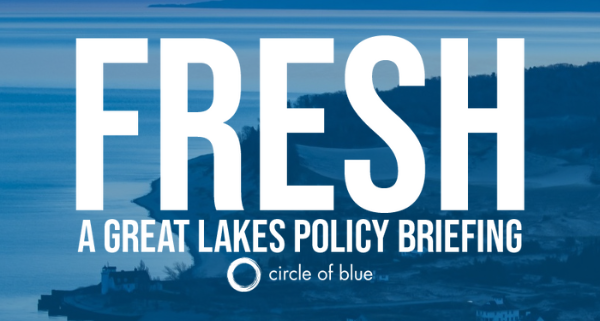

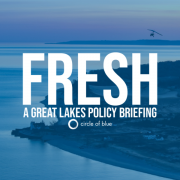
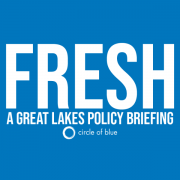

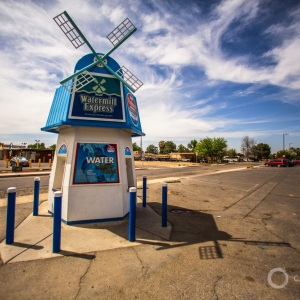
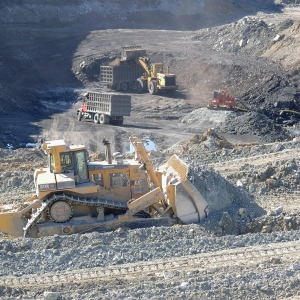
Leave a Reply
Want to join the discussion?Feel free to contribute!